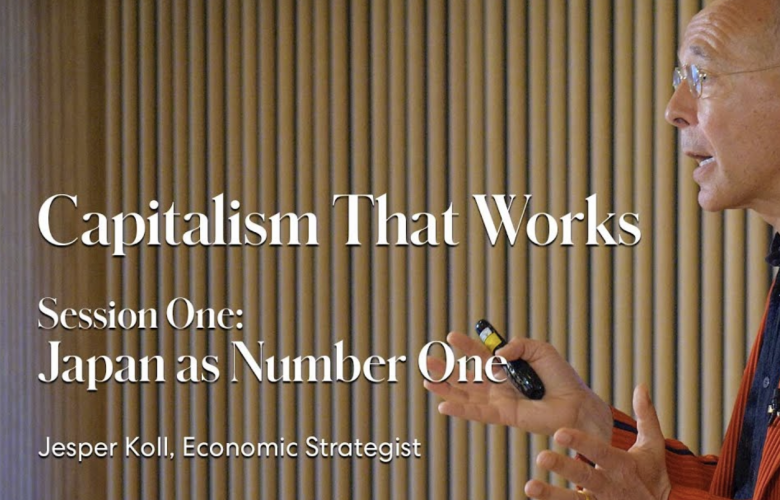Famed Japan-Based Economist Stars in First Installment of Fresh Take on Japan’s Economy
Contact
Famed Japan-Based Economist Stars in First Installment of Fresh Take on Japan’s Economy
Jesper Koll teams up with Global Treehouse in what will be an eight part series focusing on the often overlooked positives of Japan’s economy.
Jesper Koll, former chief economist of Merrill Lynch Japan and author of two books in Japanese, Towards a New Japanese Golden Age and The End of Heisei Deflation, has teamed up with Global Treehouse, a global community of leaders dedicated to what it calls “mind-fit-ness” and innovation, to release the first in an eight part deep dive into the positives of Japan’s economy.
Koll is unique as he tends to be one of the few consistent optimists about Japan’s approach to economy building and has spent a career presenting and interpreting lesser known facts about Japan’s economy often overlooked by other media.
This session is a great opportunity to hear a good dose of the other side of the coin; the opposite of the doom and gloom portrayals of Japan that are more commonly reported on.
What does this have to do with real estate? A healthy property market is directly tied to household spending, wage levels and bank lending. If there is low unemployment and upward mobility in wages, borrowers can more easily qualify for property loans, subsequently increasing demand and transaction volume.
Everything happens in real estate and learning more about overall macroeconomic trends helps in deciding whether or not to purchase.
Quotable Quotes from the Presentation
“I think Japan is currently under represented and undervalued in the global context particularly when it comes to a system of capitalism that actually works.”
---
“Japan had one of the biggest eras and longevities of deflation in world economic history. Specifically you find that real estate prices here in Tokyo, just now in 2021, are back at the level where they were when I arrived in Japan in 1985.”
---
“If you do the maths, what you find is that Japan in the 1990s destroyed more wealth than she destroyed during the Pacific War. Yet despite this unprecedented destruction of wealth, the unemployment rate never went above 6%, we never really had to worry about social problems here in Japan. And I ask you, can you imagine real estate prices in Los Angeles, in Beijing or New York, or Berlin falling back to a level last seen two generations ago? I think we would have a lot of chaos and that just shows you how resilient the overall system of capitalism here in Japan actually is.”
---
“Net financial [household] assets below ten thousand dollars is about 5.3 percent of the population. In the US, it’s almost one in three households has less than ten thousand dollars to his or her name.
---
“When it comes to resilience during the times of downturn, there is no question, that Japan is number one.”
---
“Japan is the country on earth with the lowest number of social problems.”
---
“Social problems have a very, very high correlation with income inequality.”
---
“Japan is at the right end of the spectrum, the best country in the world, in terms of low income inequality and low incidence rates of social problems. Unfortunately the US is at the other end of the spectrum with extremely high income inequality and extremely high number of social problems.”
---
“I think it is high time to recognize that indeed there is a strong causality and a strong correlation between income inequality and social problems. So what should [global] policy makers focus on? There’s no question; focus on getting the income inequality gap bridged.”
---
“Japan actually shows the way on how to close the gap between the rich and the poor.”
---
“If you look at the data, you see univocally, you do see that in Japan, the bottom 10 percent [of annual income earners] over the last 8 years are now growing faster than the average [total annual income earners].”
---
“Bringing up the bottom [10% annual income earners], Japan is the model we need to study more closely.”
---
“Once in a government panel I was asked how can we fix the pension problem. I said, well it’s very easy, just make sure that our children earn twice as much as we do.”
---
“When we look at social mobility, something economists call the intergenerational earnings elasticity, that basically measures how dependent is the economic future of the next generation on the parent’s generation economic well being.
What you find is that Japan has extremely high social mobility. So if you are born into a less fortunate, into a low-income family, here in Japan you do actually have very high opportunity of actually making it richer than your parent’s were.
Unfortunately, the US and the People’s Republic of China are at the wrong end of the spectrum where social mobility tends to be more and more correlated to the economic fortunes, to the economic well-beings, of the parent generation.”
---
“Japan is actually a model that shows that capitalism can work, can produce excellent results across a variety of measurements and really is a model that deserves to be studied more carefully [and] deserves to be follow more closely.”
---
Subscribe to Global Treehouse’ YouTube Channel to get notified when future sessions drop.
Click here for Global Treehouse’s Japanese version of the same presentation; perfect for sending to Japanese colleagues or to use in internal presentations.
Further Reading
Tokyo Legacy (Hulu Japan; 2020)





